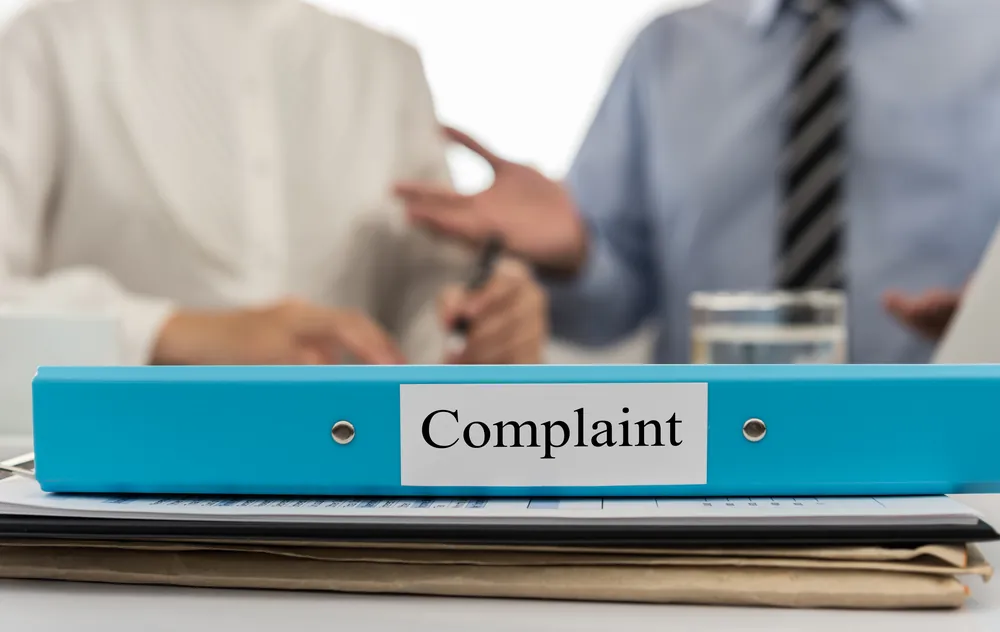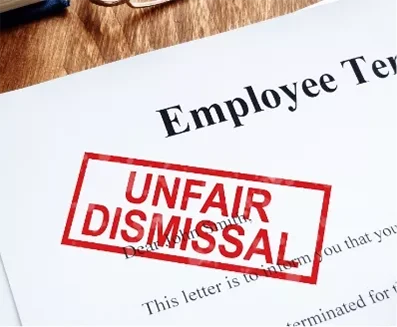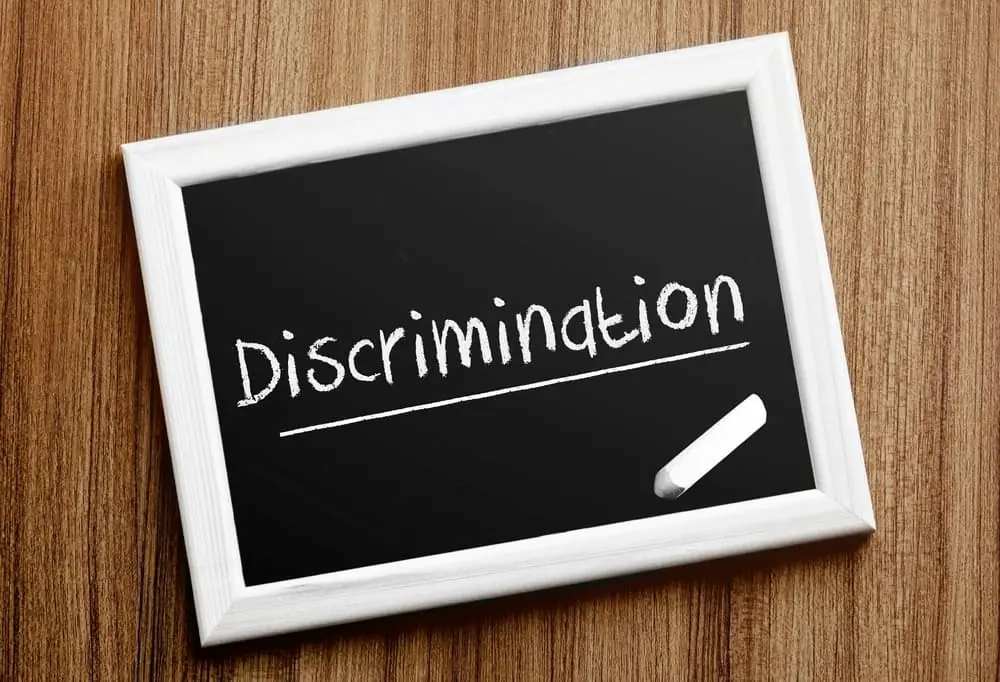Understanding your concerns and fears about potential discrimination in the workplace is important, and it’s disheartening to think that someone can be denied a job simply because of their sexual orientation.
If you believe an employer unfairly denied you a job because of your sexual orientation, consult an employment attorney familiar with workplace discrimination laws in your area. They can guide and advocate for your rights, ensuring you understand your options and potential courses of action.
Schedule a Free Case Evaluation
What Is Sexual Orientation Discrimination?

Sexual orientation discrimination refers to the unjust treatment of individuals in the workplace based on their sexual orientation. It includes various forms of discrimination and can manifest in different ways.
Some common examples include:
- Refusing to hire someone who identifies as gay, lesbian, bisexual, or queer.
- Making derogatory comments or jokes.
- Treating an employee differently based on perceived orientation.
- Firing, demoting, or denying promotions based on sexual orientation.
Such employment discrimination can be overt or subtle, direct or indirect. It doesn’t have to be explicitly stated to be considered discriminatory. Employers may engage in covert actions that negatively affect individuals based on their sexual orientation.
Federal Protections: Title VII and the Bostock Decision
Title VII of the Civil Rights Act of 1964 is a federal law that prohibits employment discrimination based on race, color, religion, sex, and national origin. While sexual orientation was not explicitly included in the original language of Title VII, in 2020, the Supreme Court ruling in Bostock v. Clayton County clarified that discrimination based on sexual orientation and gender identity is prohibited under Title VII.
The Bostock decision was a landmark ruling that affirmed that Title VII’s prohibition on sex discrimination includes discrimination based on sexual orientation and gender identity. It means that job applicants and employees across the country are now protected against discrimination based on their sexual orientation.
However, Title VII only applies to employers with 15 or more employees. Smaller businesses may be subject to different state or local laws, so it’s essential to consult with an employment attorney to understand the specific protections in your area.
What Counts as Illegal Discrimination?

Discrimination based on sexual orientation can occur at various stages of employment, including hiring, workplace treatment, promotion and advancement, and termination. Some examples of illegal discrimination include:
Hiring
Being denied a job offer based on actual or perceived sexual orientation is considered discrimination. If you believe that you were not offered a job because of your sexual orientation, consult with a workplace discrimination attorney to understand your rights and potential legal actions.
Workplace Treatment
Harassment, unfair assignments, pay discrepancies, or any differential treatment based on sexual orientation are forms of workplace discrimination. If you are experiencing any of these behaviors, it’s important to document incidents and seek legal advice to understand your options.
Promotion and Advancement
If you have been passed over for raises or leadership roles because of your sexual orientation, it may constitute illegal discrimination. Be sure to keep records of any discriminatory practices and consult with an attorney to assess your case.
Termination
Being fired due to your sexual orientation, even if there is no direct evidence, can still be considered discriminatory. Patterns of discrimination or statements made by employers can be significant factors in proving discriminatory intent. Consulting with a workplace discrimination lawyer can help you understand your rights and potential legal recourse.
Retaliation
If an employer punishes an employee for reporting discrimination or taking legal action, it is considered retaliation. This is illegal, and employees who experience retaliation should seek legal advice.
Common Sexual Orientation Discrimination Examples and Red Flags
In addition to the clear examples of sexual orientation discrimination mentioned above, there are often subtle red flags that indicate discriminatory practices in the workplace. Some common examples include:
- Questions about marital status or gender identity in job interviews: These questions can be an attempt to discriminate against LGBTQ+ individuals.
- Inappropriate jokes or “banter” related to LGBTQ+ topics: Such jokes create an unwelcoming and hostile environment for LGBTQ+ employees.
- Being excluded from networking or client-facing opportunities: This exclusion can hinder career advancement and demonstrate discrimination based on sexual orientation.
- Negative performance reviews after coming out at work: If coming out as LGBTQ+ leads to negative treatment or biased performance evaluations, it may indicate discrimination.
- Sudden changes in work conditions after disclosing sexual orientation: Employers may react negatively to an employee’s disclosure of their sexual orientation, resulting in unfavorable changes in work conditions.
These examples and red flags can help recognize potential discrimination in the workplace. Documenting incidents and seeking advice from a workplace discrimination lawyer can help determine if legal action is necessary.
How to Document and Respond to Workplace Discrimination

If you believe you are experiencing workplace discrimination based on your sexual orientation, it’s imperative to collect and document evidence to strengthen your case. Here are some important steps to take:
- Keep written records: Document incidents, including emails, texts, and performance reviews, that indicate discrimination or unfair treatment.
- Log incidents: Maintain a detailed log of discriminatory comments or actions, noting dates, times, locations, and individuals involved.
- Report issues to HR or a supervisor in writing: Make a formal complaint in writing to create a record of your concerns. Keep a copy for your own records.
- Avoid retaliation traps: Before responding to discriminatory actions, familiarize yourself with your legal rights. Retaliation for reporting discrimination is illegal, so proceed with caution and seek legal advice if necessary.
- Gather evidence early: The sooner you start documenting incidents, the easier it will be to build a strong case if legal action becomes necessary.
When you hire a skilled workplace discrimination attorney, they can help you gather and preserve valuable evidence for your claim. With their experience and knowledge, they know what types of evidence can help prove your claim.
When Should You Contact a Workplace Discrimination Attorney?
If you believe you have been denied a job or promotion because of your sexual orientation, or if you are facing harassment or retaliation in the workplace, now is the time to consult with a workplace discrimination attorney. Here are some instances in which seeking legal advice is recommended:
- Denied a job or promotion: If you suspect that your sexual orientation played a role in being denied a job opportunity or being passed over for a promotion, a workplace discrimination attorney can assess your case and help you understand your options.
- Harassment or retaliation: If you are being harassed or facing retaliation because of your sexual orientation, be sure to seek legal guidance. A workplace discrimination attorney can help protect your rights and advocate for a safe and inclusive work environment.
- Unsure about legal action: If you are unsure whether the treatment you are experiencing constitutes illegal discrimination, a workplace discrimination attorney can evaluate your situation and provide clarity on the legal aspects of your case.
- Unresponsive or dismissive HR: If you have reported discrimination to your employer’s HR department but have not received a satisfactory response, consulting with an attorney can help ensure your concerns are taken seriously.
By contacting a workplace discrimination lawyer, you can receive a professional assessment of your situation and understand the next steps to protect your rights.
How to File a Discrimination Claim
If you decide to pursue legal action for workplace discrimination based on your sexual orientation, filing a claim with the Equal Employment Opportunity Commission (EEOC) may be necessary. Here’s an overview of how the process typically unfolds.
In most cases, you have 180 days from the date of the discriminatory act to file a claim with the Equal Employment Opportunity Commission (EEOC), although this deadline can vary depending on your local laws and specific situation. The first step is to submit a charge of discrimination with the EEOC, including detailed information about the discrimination you faced. Once your claim is filed, the EEOC will begin its investigation.
During this period, the EEOC might suggest mediation to resolve the dispute. Mediation is a voluntary process in which a neutral third party helps you and your employer communicate and possibly reach an agreement without going to court.
If mediation is unsuccessful or the EEOC concludes its investigation without resolving the matter, you may be issued a “right-to-sue” letter. This letter gives you the legal permission to file a lawsuit against your employer.
Having a well-versed workplace discrimination attorney by your side is extremely valuable throughout this process. A workplace discrimination lawyer can help you understand your rights, protect your interests, and navigate the legal steps to achieve the best possible result.
What Compensation Might Be Available?
If you succeed in a discrimination claim based on your sexual orientation, there are several types of compensable damages you may be entitled to, each designed to make you whole and hold your employer accountable for their unlawful actions. One of the most common forms is back pay, which covers lost earnings from the time of the discriminatory act until the resolution of your case. It ensures that you are financially compensated for the income you would have earned if the discrimination had not occurred.
In cases where you were wrongfully terminated or forced to resign, reinstatement to your previous job may be an option. Alternatively, if returning to your former role is not feasible due to a hostile environment or other factors, you might receive assistance securing comparable employment. In either case, the goal is to help you regain financial stability and continue your career without the burden of discriminatory disruption.
Emotional distress is another significant component of many successful claims. Being subjected to discrimination can have lasting psychological effects, including anxiety, depression, and a diminished sense of self-worth. Courts and juries often recognize this harm and may award compensatory damages to acknowledge the emotional toll the experience has taken on you.
Punitive damages may also be awarded in more egregious cases where an employer’s conduct was malicious or reckless. These are not tied to your actual losses but serve to punish the employer and deter others from engaging in similar misconduct. Punitive damages are typically reserved for the most severe violations and can significantly increase the overall value of a claim.
Another important compensation element can be the reimbursement of attorney’s fees and court costs. Pursuing a discrimination claim can be expensive, but if you prevail, your employer may be required to cover your legal expenses. This provision exists to ensure that financial barriers do not prevent victims from seeking justice.
In many situations, discrimination cases are resolved through settlement agreements rather than going to trial. These agreements often include monetary compensation, specific terms of resolution, and sometimes even changes to workplace policies or practices. It’s also common for settlement agreements to include confidentiality clauses, which prevent either party from discussing the terms publicly. While confidentiality can protect your privacy, you should understand what you are agreeing to before signing.
Ultimately, the specific forms of compensation you may receive will depend on the facts of your case, the evidence presented, and whether the matter is resolved through settlement or litigation. Because every case is different, consulting with a reputable workplace discrimination lawyer is essential. They can evaluate the strength of your claim, explain your legal options, and help you pursue the maximum compensation available. Your attorney will also ensure that any settlement terms are fair and your rights are fully protected.
Take Action If You’ve Been Discriminated Against Due to Your Sexual Orientation
It is illegal to be denied a job or mistreated in the workplace because of your sexual orientation across the entire United States. Understanding your rights and taking appropriate action is often necessary to protect yourself.
If you believe you have experienced discrimination based on your sexual orientation, such as being denied a job, don’t wait or handle it alone. Contact a reputable workplace discrimination lawyer to assess your situation professionally and understand the next steps. They can provide the necessary guidance and support to help fight for justice and protect your rights.
Remember, you have the right to a workplace free from discrimination, regardless of your sexual orientation. Take action today and seek the legal help you deserve if you believe you have been denied a job based on your sexuality. Contact a workplace discrimination lawyer near you to protect your rights.